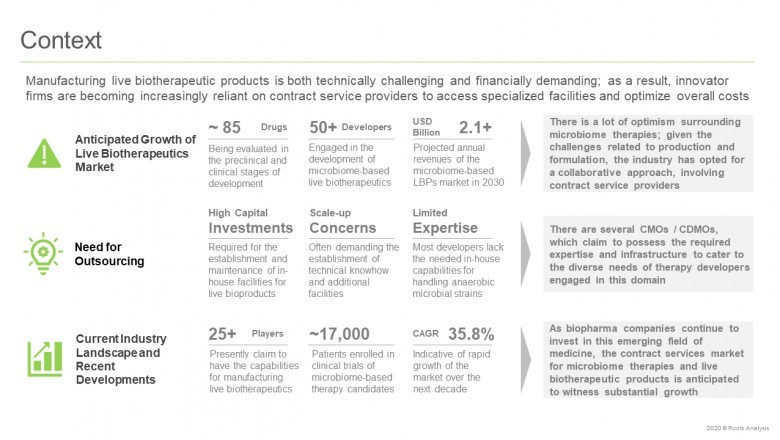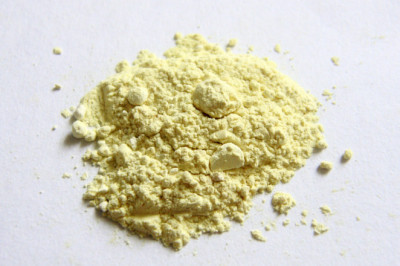views

The microbial contract biomanufacturing market is projected to be worth USD 9.3 billion by 2030, growing at a CAGR of 8.7%, claims Roots Analysis
The growing pipeline of biologicsthat can be produced in microbial systems, such as antibody fragments andplasmid-based therapies, is anticipated to offer lucrative opportunities toservice providers serving this niche, but growing market segment
London
Roots Analysis has announced theaddition of the “Microbial ContractBiomanufacturing Market, 2020-2030” reportto its list of offerings.
Despitemammalian cell cultures being the preferred manufacturing approach forbiologics, recent advances in microbial fermentation have enabled thedevelopment of versatile biomanufacturing systems, which are both robust andcost friendly. Presently, a number of service provider companies claim to offerend-to-end solutions, ranging from product development to commercialproduction, for microbial biologics. Given the obvious advantages ofoutsourcing, drug developers are likely to continue relying on contract serviceproviders for various aspects of their respective microbial biologic developmentprograms.
To order this 320+ page report, which features 150+ figuresand 150+ tables, please visit this link
KeyMarket Insights
Over115 CMOs claim to offer manufacturing services for microbial biologics
Themicrobial contract biomanufacturing market is highly fragmented, featuring amix of small, mid-sized, large and very large players. It is worth mentioning thatmore than 50% of CMOs mentioned in the report, have the necessary capabilitiesto manufacture biologics across all scales of operation (preclinical,clinical and commercial).
Presently, more than 70% of service providers use bacterialexpression systems
Recently,a number of microbial biologics manufacturers are shifting to yeast-based productionsystems. It is also worth highlighting that close to 30% of CMOs, identified inthis research, claim to have the required capabilities to manufacture biologicsusing both bacterial and yeast-based systems.
Europe is currently regarded as a key manufacturing hub formicrobial biologics
Thereare more than 150 manufacturing facilities, with microbial fermentationcapabilities, worldwide; of these, 43% are in Europe, followed by North America(31%). On the other hand, prominent regions in the Asia Pacific and Middle East,where microbial biologics are manufactured, include (in decreasing order ofnumber of resident manufacturing facilities) China, India, Japan, Australiaand Israel.
Severalpartnerships were established in this domain, during the period 2016-2020
Majorityof the deals recorded in the report, were established in 2019. Further, a largenumber (~25%) of the partnerships were observed to be focused on the productionof microbial biologics; this is followed by process development andmanufacturing agreements (20%).
Further,multiple expansion initiatives were undertaken by CMOs, since 2016
Morethan 30% of expansion projects over the last few years were focused on the establishmentof new facilities, followed by those involving the expansion of existing manufacturingfacilities (28%). Further, 50% of the expansion initiatives mentioned in thereport, were in undertaken by stakeholder companies in Europe, followed NorthAmerica (39%).
Bigpharma players have also been active in this upcoming field
Around60% of the initiatives undertaken by big pharma were reported in the period 2016-2020.Of these, 57% involved the establishment of strategic partnerships with otherindustry stakeholders. It is worth highlighting that, interms of type of biologic, close to 49% of theseinitiatives were focused on recombinant proteins.
NorthAmerica and Europe are anticipated to capture over 80% share (in terms ofservice revenues) of the market, by 2030
Atpresent, more than 60% of the total revenues are generated from commercializedmicrobial biologics, and this trend is unlikely to change significantly inshort to mid-term. Further, it is worth mentioning that the contractbiomanufacturing market for microbial biologics in the Middle East and NorthAfrica is anticipated to grow at a relatively faster rate (10.3%), followed byAsia Pacific (9%).
To request a sample copy / brochure of thisreport, please visit this link
Key Questions Answered
§ Who are the leadingCMOs engaged in the production of microbial biologics?
§ What are thepreferred microbial systems for the development and manufacturing of biologics?
§ Which are the keymicrobial fermentation technology platforms currently available in the market?
§ What kind ofpartnership models are commonly adopted by stakeholders in this industry?
§ What are the various initiativesundertaken by the big pharma players engaged in this domain?
§ What are the keyfactors influencing the make (manufacture in-house) versus buy (outsource)decision related to the production of microbial biologics?
§ What are the keytrends within the microbial contract biomanufacturing market?
§ How is the currentand future market opportunity likely to be distributed across key marketsegments?
The USD 9.3 billion (by 2030) financial opportunitywithin the microbial contract biomanufacturing market has been analyzed acrossthe following segments:
§ Type of Product
§ API
§ FDF
§ Type of Biologic
§ Proteins
§ Enzymes
§ Growth Hormones
§ Antibody based Drugs
§ Others (plasmidDNA, probiotics, microbiome-based biologics)
§ Type of Microbial ExpressionSystem
§ Bacteria
§ Yeast
§ Others (Algae andfungi)
§ Scale of Operation
§ Commercial
§ Preclinical /Clinical
§ Type of End User
§ Small Companies
§ Mid-sized Companies
§ Large / Very LargeCompanies
§ Key GeographicalRegions
§ North America
§ Europe
§ Asia Pacific
§ Middle East and NorthAfrica
§ Latin America
Thereport features inputs from eminent industry stakeholders, according to whom,currently, over 50% operations related to both API and FDF manufacturing ofmicrobial biologics are outsourced to third party service providers. The reportincludes detailed transcripts of discussions held with the following experts:
§ Gaurav Kaushik (ChiefExecutive Officer and Managing Director, MeteoricBiopharmaceuticals)
§ Debbie Pinkston (VicePresident, Sales and Business Development, List Biological Laboratories)
§ Andrea Conforto(Sales and Marketing, Bioservices Director, Olon)
§ Max Rossetto (GeneralManager, Business Development, Luina Bio)
§ Rob van Dijk(Business Development Manager, WACKERBiotech)
Theresearch covers profiles of key players (listed below); each profilefeatures an overview of the company, information related to its microbial manufacturingfocused service portfolio, production facilities and capabilities, and aninformed future outlook.
§ AGC Biologics
§ Aldevron
§ BioVectra
§ EirGenix
§ Etinpro
§ Eurogentec
§ NorthwayBiotechpharma
§ Ology Bioservices
§ Porton Biopharma
§ Stelis Biopharma
Foradditional details, please visit
https://www.rootsanalysis.com/reports/microbial-contract-biomanufacturing-market.html oremail sales@rootsanalysis.com
Youmay also be interested in the following titles:
1. DrugRepurposing Service Providers Market, 2020 – 2030
2. AntibodyDiscovery Services and Platforms Market (3rd Edition), 2020-2030
Contact:
GauravChaudhary
+1(415) 800 3415
+44(122) 391 1091












